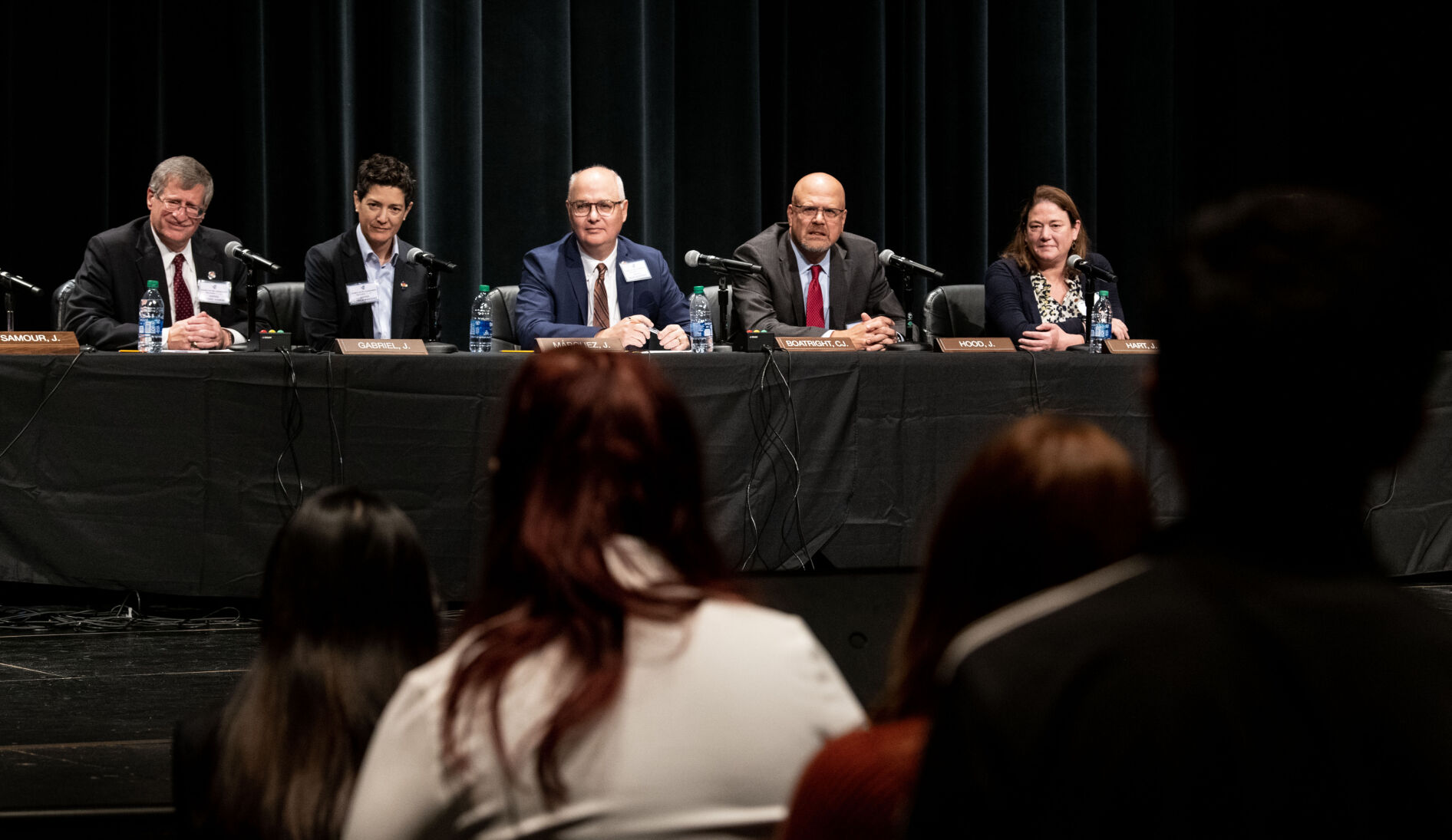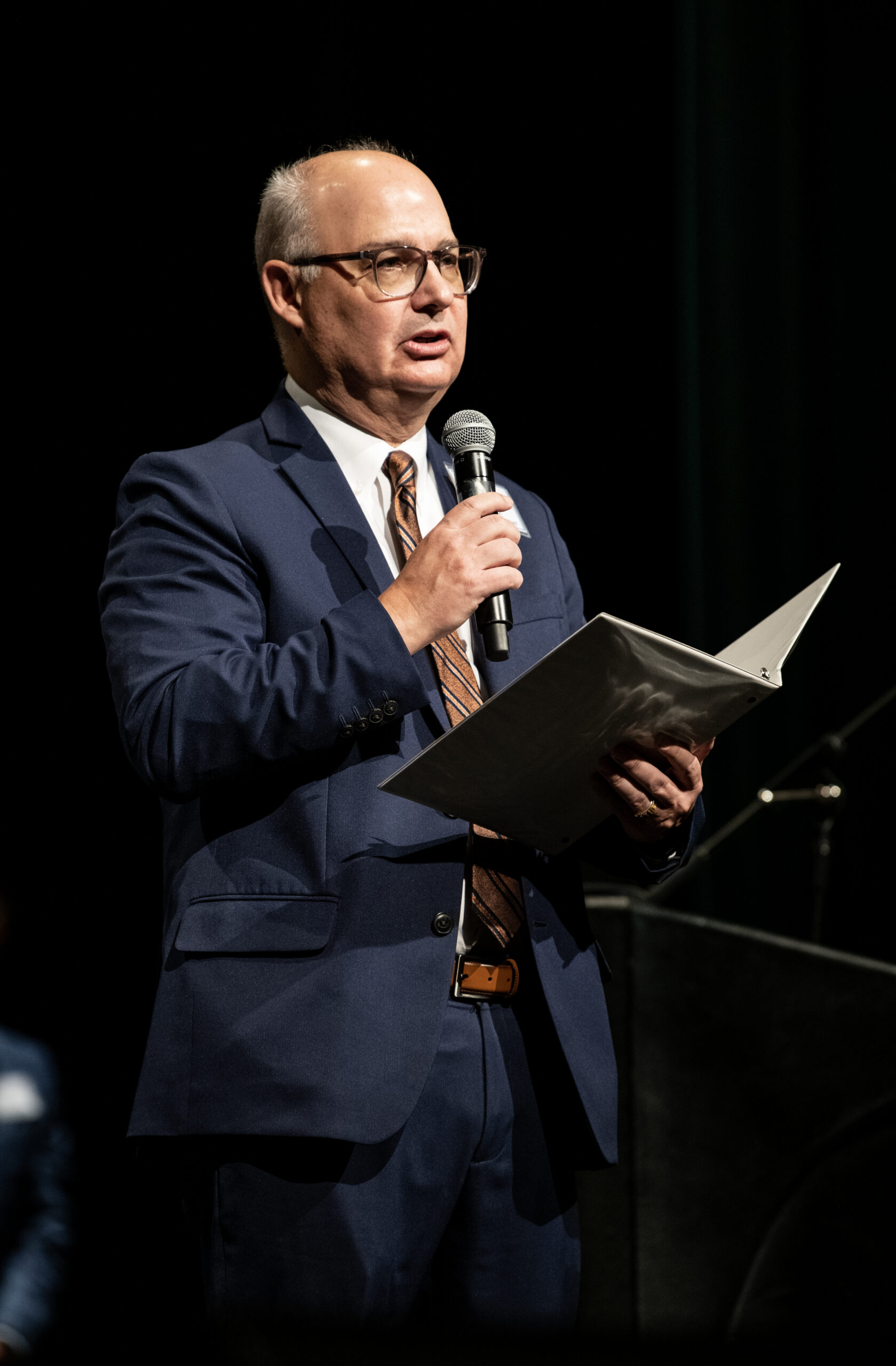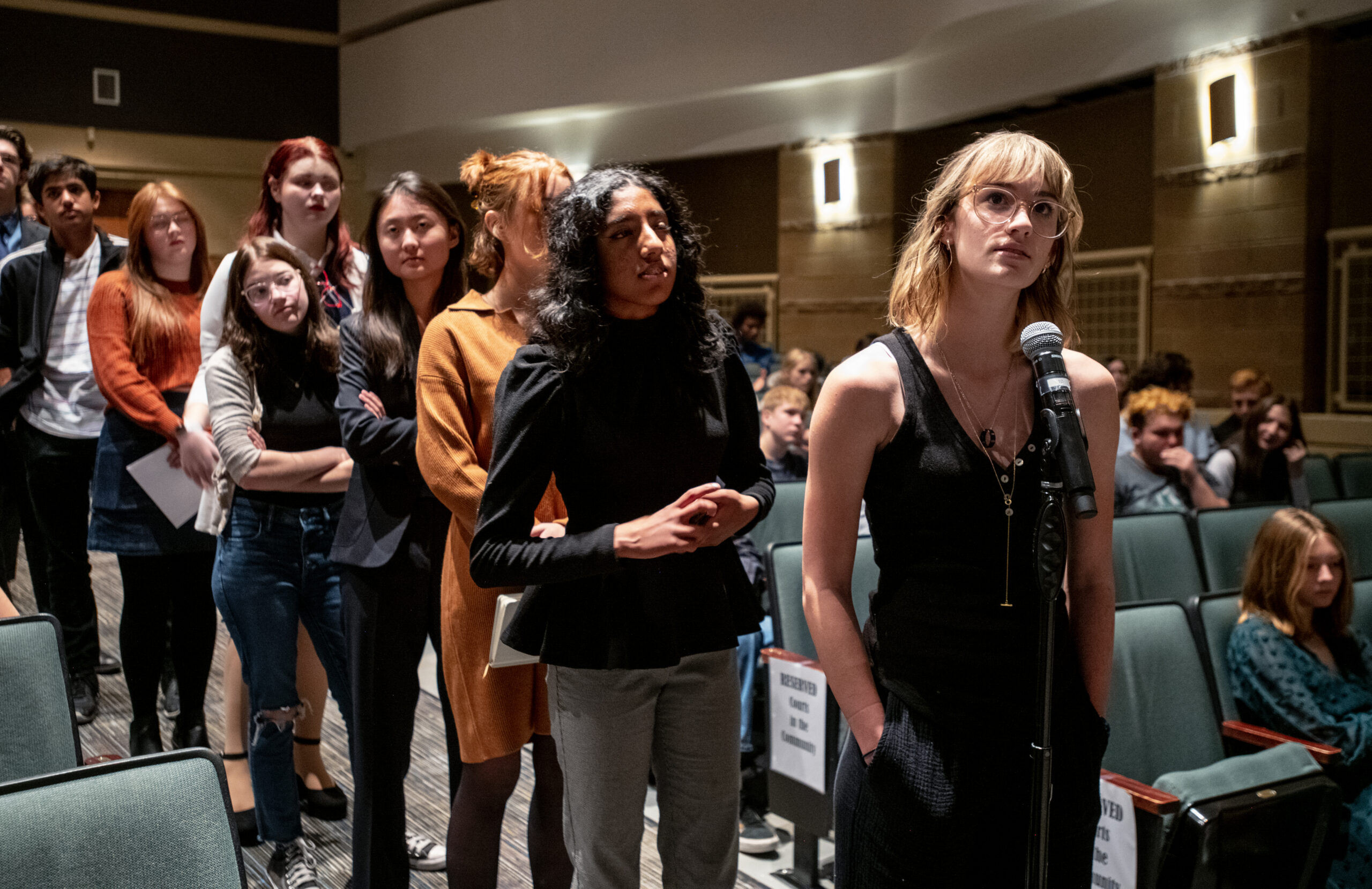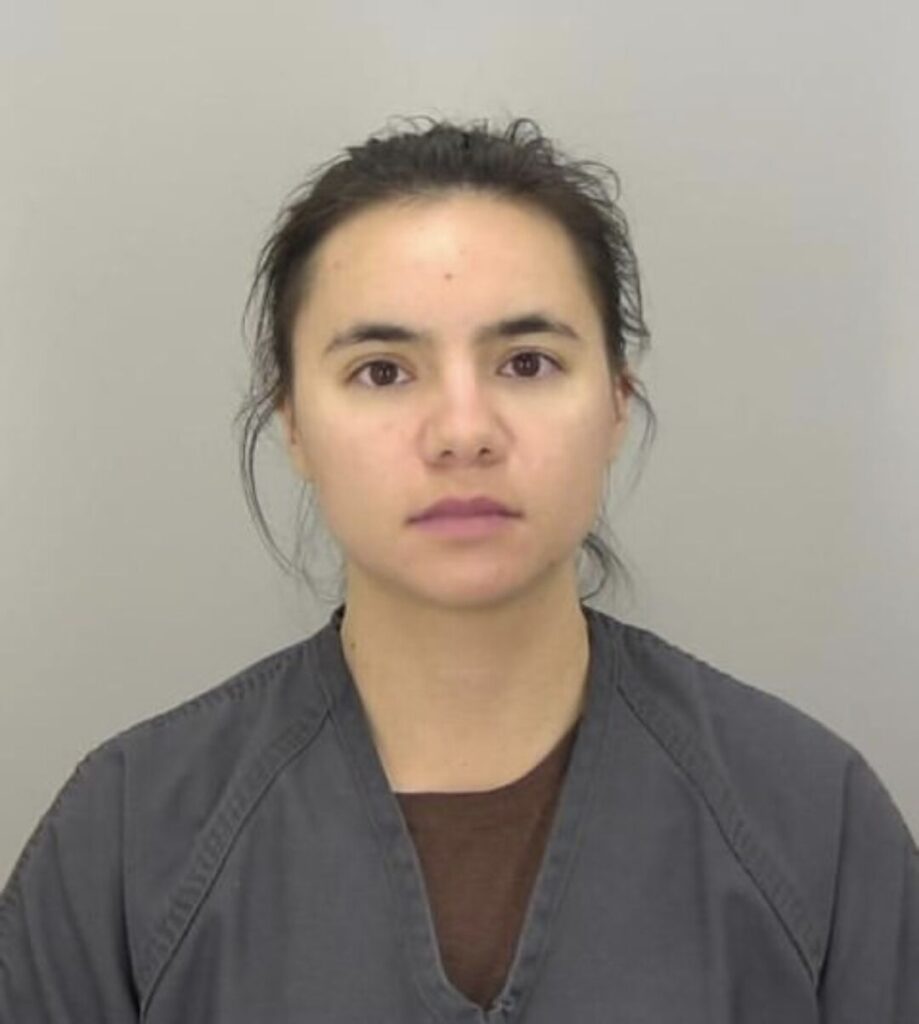‘Once-in-a-lifetime experience’: Supreme Court, students engage at Colorado Springs school

It took social studies teacher Ty Allen several years to bring the Colorado Supreme Court to his high school in Colorado Springs, but Allen’s efforts paid off on Thursday when the state’s seven justices appeared before an auditorium of Pine Creek High School students and staff.
“I’ve been reaching out to them every couple of months and asking if they could consider us. They finally said yes,” Allen said. “Anytime we can give the kids educational opportunities that aren’t traditional, that’s the goal as a teacher.”
Since 1986, the state’s Judicial Department has operated its Courts in the Community initiative, extricating the Supreme Court from its courthouse in downtown Denver and enabling students to witness oral arguments in real cases in schools across the state. The Court of Appeals also ventures out twice per year, and was the first court to visit Pine Creek in 2018.
Chief Justice Brian D. Boatright acknowledged at the beginning of the event that the visit to Pine Creek was the first outing for the court in a year. The justices intended to hold arguments in Grand Junction in the spring, but he contracted COVID-19, which resulted in the trip’s cancelation.
“This is one of our favorite days of the year,” Boatright said in introducing the court to the students. “The justices are a lot like second graders: We have assigned seats everywhere we go.”

The bulk of the event was consumed by two hour-long oral arguments in a pair of criminal appeals. In Forgette v. People, the question was whether a juror who fell asleep twice during a Denver trial imperiled the defendant’s right under the state constitution to a jury of 12 members. The defendant, Elliott J. Forgette, argued that the sleeping juror could not pay attention to the presentation of evidence, effectively creating an 11-person jury. The government countered that Forgette’s lawyers never objected at trial.
The second case, Johnson v. People, questioned the meaning of a key gun safety law enacted after the Columbine High School massacre, which prohibits people from purchasing a firearm with the intent to transfer it to someone who is prohibited from owning a gun. The word “transfer,” however, is not defined in the law.
“Before heading in, our teacher briefed us on the cases and we had class discussions about what our thoughts were,” said Dana Ko, a senior. “Some of the questions we had in class weren’t necessarily answered here today, which is just how the law is.”
She added that sometimes, “there isn’t one clear answer.”

After each set of arguments, students had the opportunity to question the lawyers for both sides. Although several of the questions were specific to the facts of the cases or the attorneys’ arguments, some students were interested in the more personal aspects of their jobs.
“Have you ever encountered a situation where your personal experiences or bias influence the way you handle a certain case, possibly with emotional attachments about what’s going on?” one student asked.
“A lot of cases that we work, especially in the criminal world, they have a high emotional standard,” said Joseph G. Michaels of the Colorado Attorney General’s Office. “But we’re not the person who experiences the crime. We’re there to stand up for them in the court of law. And both sides are about preserving constitutional rights and preserving statutory rights and seeing justice is done.”
The members of the court had a similar view of their own professional responsibility.
“One of the things you have to ask yourself before you become a judge is, can I set aside my personal feelings?” said Justice Melissa Hart. She recalled that the first opinion she wrote as a Supreme Court justice involved migrant farmworkers who were suing their former employer for unpaid wages.
“I read the facts of the case and I thought, ‘I’m gonna be one of the justices who says these employers should get in trouble,'” Hart said. “But then I read the legal analysis. The law the legislature wrote could not solve that problem. … My job is to apply the statute the legislature wrote.”

Justice William W. Hood III also defended the work of the courts, asserting the judiciary’s adherence to the law is its distinguishing feature from the elected branches of government.
“There is a lot of cynicism these days about judges sometimes seeming like politicians in robes,” he said. “Most judges around the country and all the judges on our court are making an effort to be intellectually honest about how the law is applied and not just picking out policy choices and pretending we’re king for a day. That’s not how we roll.”

The students who attended the session with the Supreme Court were sophomores, juniors and seniors in the AP government, business law and “street law” classes, the latter of which provides a hands-on approach to learning the law. Teacher Joseph Rausch praised Allen for his persistence in inviting the Supreme Court to Pine Creek.
“This is a really big, big deal, obviously,” Rausch said. “One thing our kids here do care about is the First Amendment, Second Amendment, the Bill of Rights, those rights that we have as Americans and the application of those. Those are often the conversations we get in class that they’re the most interested in.”
He also estimated there were an additional 125 students who came to watch the court who were not obligated to attend.
“This is kind of a once-in-a-lifetime experience for all of us,” Rausch said. “What percentage of high school kids around the nation ever get an opportunity like that?”
Cole Freyler, a senior, said afterward that other schools in the state with fewer opportunities for their students should also be able to experience the Courts in the Community program.
“Being able to see firsthand, I think, is gonna inspire a new generation of lawyers and judges. I know a lot of us today, even just sitting there watching, were really fired up,” he said.
The justices described to the students their paths in reaching the bench, with substantial differences between them.
Boatright said he had a judge treat him poorly once, which inspired him to apply for a judgeship because “there was a better way of handling situations.” Justice Maria E. Berkenkotter was a retired trial court judge from Boulder County, working as a mediator, when she applied to the Supreme Court. Justice Richard L. Gabirel was the first person in his family to go to college, then “made a lot of money” as a lawyer.
“When I was in private practice, I donated my time representing abused children. I did a death penalty case. It was an obligation to give back,” he said. “The biggest way I could give back was to be a judge some day.”

Caleb Chung, a senior, said he was considering a career in law prior to Thursday, but the Courts in the Community experience nudged him further in that direction.
“We often think of the justice system as this abstract machine. To be able to see into it, you realize all the rights at the foundation of this country are being decided every single day, are being affirmed every day,” Chung said.
Students were also curious to know how the Supreme Court chooses its cases and how long it takes to issue a decision. Justice Monica M. Márquez explained the process of drafting opinions, and potentially writing dissents, can take weeks or months.
“Just like a group project,” one student observed.
“The group project analogy is spot on. It can be challenging,” Márquez agreed.















